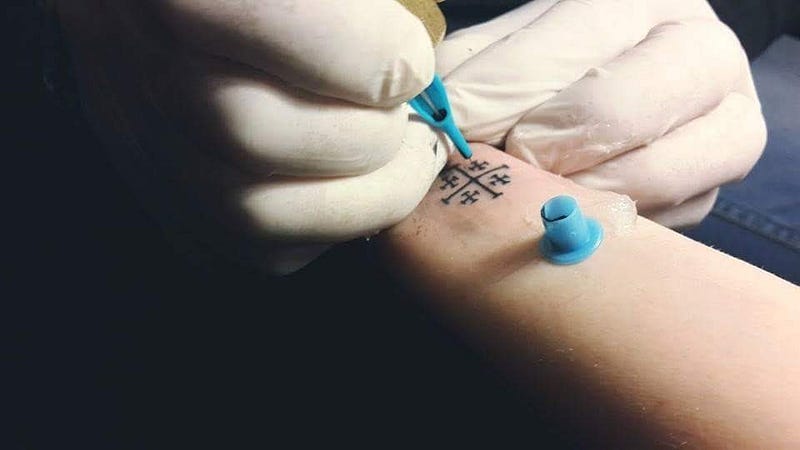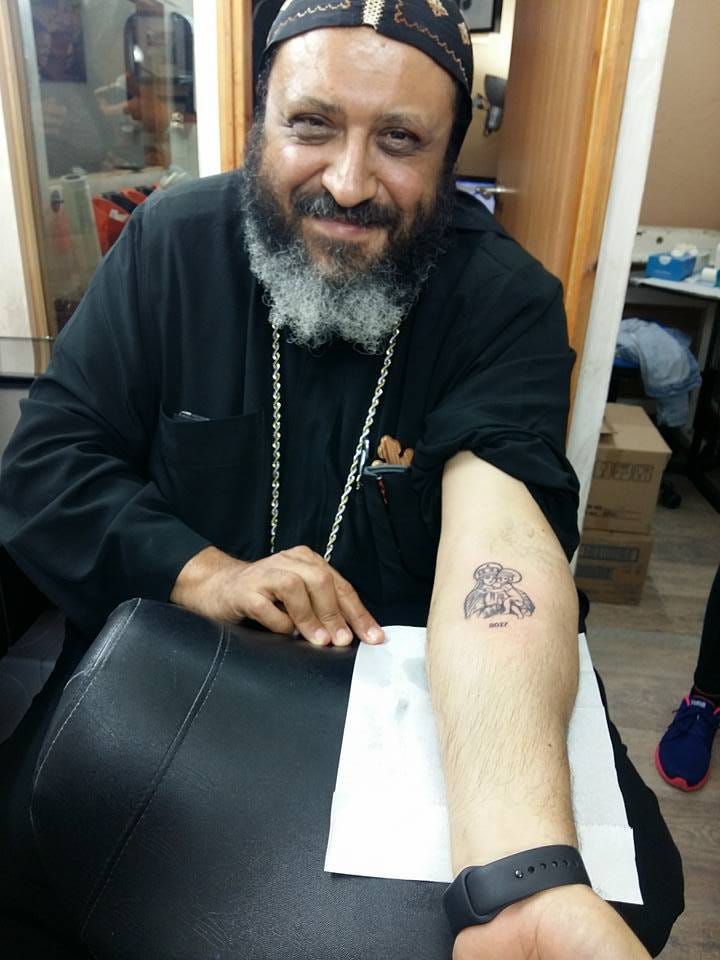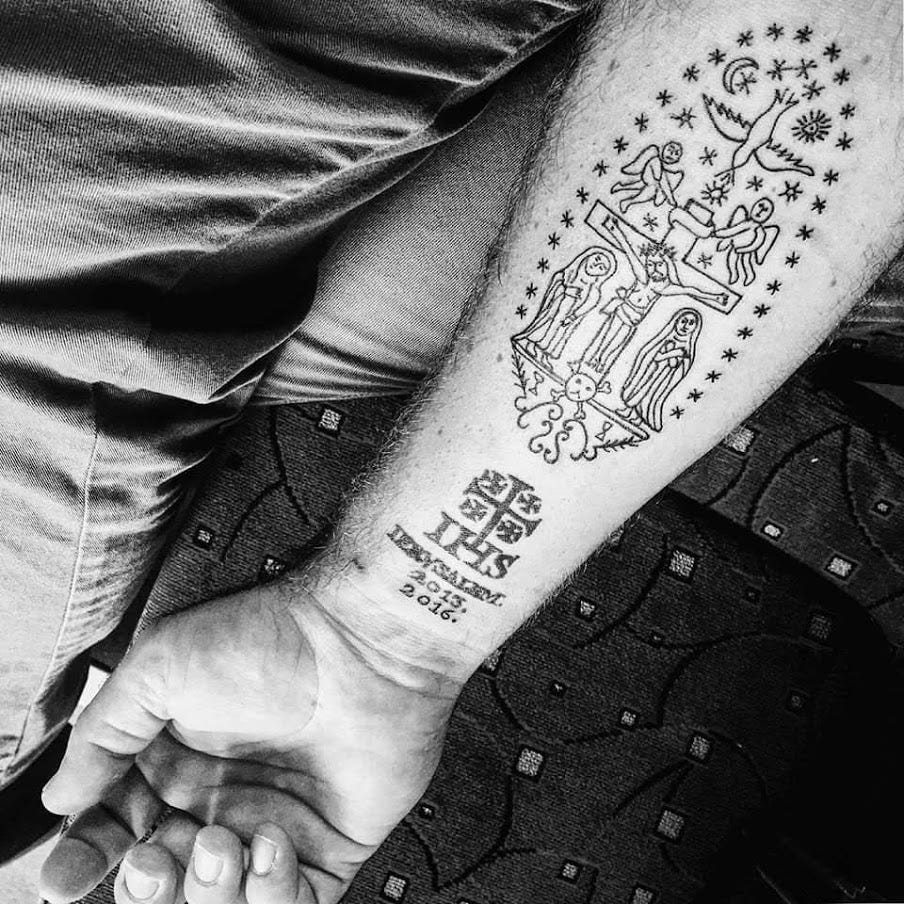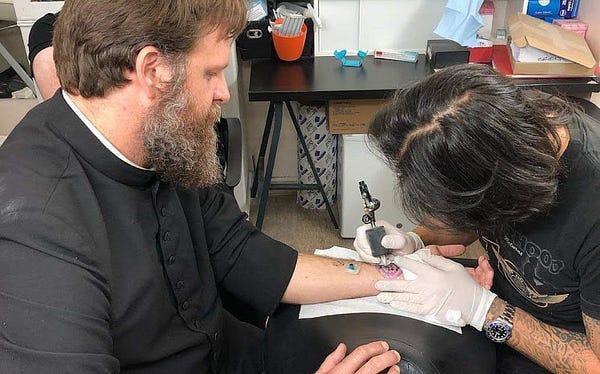Tattoos, Piercings & the Church
I remember a conversation I had with a young adult man who was interested in becoming Catholic. He had invited me out to lunch, and as we…
I remember a conversation I had with a young adult man who was interested in becoming Catholic. He had invited me out to lunch, and as we sat on the patio of the restaurant, enjoying the sunshine and good pizza, I could tell something was weighing on him. We chatted for a bit and then he got to the point: “Is the Catholic Church going to have a problem with my tattoos?”
I smiled (relieved that it wasn’t a more major quandary) and assured him that the Church would not have a problem with his tattoos, and in fact wouldn’t care if he got a few more.
But his nervousness was understandable. His past experience with different Protestant denominations had taught him that some Christians didn’t mind his tattoos, some quietly tolerated them, while others forbid them outright. He was justifiably curious: what does the Catholic Church teach about tattoos?
Nothing, as it turns out. At least not directly. It may come as a surprise to some, but the Catholic Church does not have a particular teaching about every little thing. Generally speaking, unless something is objectively immoral, or we have immoral motives for doing it, Catholics are free to do as we wish.
If you look up “tattoo” in the index of the Catechism of the Catholic Church, you’ll come up empty. But while you are looking in the “T” section, you will find the word temple, with a sub reference to the human body, directing you to paragraph 364. There you will find this relevant quote from the Second Vatican Council’s Pastoral Constitution on the Church in the Modern World (Gaudium et Spes).
Man, though made of body and soul, is a unity. Through his very bodily condition he sums up in himself the elements of the material world. Through him they are thus brought to their highest perfection and can raise their voice in praise freely given to the Creator. For this reason man may not despise his bodily life. Rather he is obligated to regard his body as good and to hold it in honor since God has created it and will raise it on the last day (GS 14, 1).
While the Church does not have a specific teaching on tattoos, it definitively teaches that we are obligated to honor our bodies and to regard them as good. When we consider things like tattoos or piercings, we should be asking, am I honoring my body as a God-given good?
Piercings
Let’s look at piercings first. Is there anything objectively wrong with decoratively piercing part of your body? Consider this passage from Ezekiel in the Old Testament:
“I adorned you with jewelry, putting bracelets on your arms, a necklace about your neck, a ring in your nose, earrings in your ears, and a beautiful crown on your head” (Ez 16:11–12).
God here is speaking to Jerusalem in the language of a groom addressing his bride. The image of God as the faithful bridegroom and Israel as the (often unfaithful) lover is common throughout the scriptures. In this passage, God is reminding his bride of the good things he bestowed upon her, which includes piercings for her nose and ears.
This doesn’t mean that everyone should go out and pierce their nose, but it does indicate that these sorts of decorative piercings are not objectively immoral, if God is using them as a means of describing how beautiful he has made his bride, Jerusalem. This doesn’t mean that there are not other concerns to keep in mind (we’ll get to those later). But in and of themselves, there is nothing immoral about piercings.
Tattoos
So the Bible mentions piercings in a favorable light. Does it ever mention tattoos? Yup.
“Do not lacerate your bodies for the dead, and do not tattoo yourselves. I am the Lord” (Lev 19:28).
So does that settle it? The Bible forbids tattoos therefore Christians shouldn’t get them? Not quite.
Leviticus is an Old Testament book containing ritual laws for Jewish liturgy, and laws regarding ritual and moral purity. These laws are no longer binding on Christians. For example, the verse immediately preceding this says, “Do not clip your hair at the temples, nor spoil the edges of your beard” (Lev 19:27). This is why Orthodox Jews have long hair at their temples and keep their beards long. So why don’t Christians?
For the same reason Christians no longer follow many of the other rules in Leviticus, such as the rules prohibiting eating shellfish or pork. The Mosaic Law (the Law given to Moses and recorded in Leviticus and other places in scripture) has been fulfilled in Christ. Any Christian who thinks the laws of Leviticus still apply to them needs to go back and read the Acts of the Apostles where the leaders of the early Church discerned (with the help of a few heavenly visions) that Christians have been freed from the old law.
That being said, there are some things forbidden in Leviticus that Christians do still forbid. For example, the verse immediately after the one condemning tattoos says, “You shall not degrade your daughter by making a prostitute of her” (Lev 19:29). That is still verboten because things like prostituting out your daughter are wrong whether or not there is a rule against it. Leviticus also forbids things like murder and adultery. Christians still hold these things to be wrong because they are objectively immoral.
Eating pork, on the other hand, was wrong for the Jewish people because it violated a rule that was in force, not because eating pork is wrong. When the rule is no longer in force, eating pork is allowed.
So what about tattoos? Is getting a tattoo like eating pork, or like committing murder? Why were they forbidden in the Mosaic Law in the first place?
Tattoos were not uncommon among the peoples who lived in the same region as the ancient Jews. Many of their tattoos had religious significance, with people branding themselves with the name of a god they were devoted to. Much of the law in Leviticus is meant to prevent the Jewish people from falling into the pagan religious practices of the peoples who surrounded them. They were there to shore up their own national and religious identity. So when Leviticus says not to tattoo yourself, it’s saying not to participate in this pagan ritual practice.
And Christians still should not participate in pagan rituals, whether they involve tattoos or not. But that’s not why most people get tattoos today.
Christian Tattoos
Most opposition to tattoos among American Christians is cultural, not scriptural. For a long time in America, tattoos were associated with subcultures that were considered undesirable. Apart from sailors, most people who had tattoos had either been in prison or in a gang. It wasn’t something done in “polite society.” But modern WASP America is just a small slice of the Christian pie.
Christians have been tattooing themselves for a long time. One of the earliest archaeological examples is the naturally mummified remains of a Sudanese woman in the custody of the British Museum with a monogram of St. Michael tattooed on her inner thigh (it’s the Coptic monogram for the name Michael surmounted by a cross).
In medieval Europe, tattoos were associated with religious pilgrimages, especially to Jerusalem. Pilgrims to the Holy Land would mark the completion of their journey with a tattoo, often of a Jerusalem Cross, or another symbol indicating the place of their pilgrimage. The practice likely dates to the time of the Crusades or even earlier. In fact, there is one family that claims to have been leaving its mark upon pilgrims to the Holy Land for 700 years. The Razzouk family has been tattooing Christian pilgrims from Roman, Coptic, Ethiopian, Armenian and Maronite traditions since 1300 AD.
Tattoos have a special significance in the Coptic Christian tradition. Most Coptic Christians in Egypt have a small cross tattooed on the inside of their wrist as a means of identification. Living among a majority Muslim population, the tattoo identifies their faith in a visible way, and allows them admittance to churches and holy sites.
Some claim this Coptic tradition started in the sixth century, with monks marking their bodies with Christian symbols. (The Latin word for tattoo is stygma, the same word used to describe the marks of Christ’s wounds). Others say it dates to the seventh century invasion of Arab Muslims who forced Christians to be tattooed as a form of branding. Either way, it has been common practice among Egyptian Christians for many centuries.
Prudential Considerations
The historical tradition of tattoos within Christianity demonstrates pretty clearly that there is nothing anti-Christian about getting a tattoo. But there are other prudential factors to consider.
One is safety. Part of respecting your body means not doing anything that needlessly puts it at risk. Tattoos and piercings both break the skin and introduce foreign elements into the body. Granted, the risk of infection is pretty minimal these days, especially if you go to a reputable business. But health is still something to consider. Don’t put your body at risk.
Another consideration is how will others perceive this? Tattoos are much more accepted today than they were a generation or two ago. But they are still seen as counter-cultural by many in America. I’m not saying you should allow other people’s perceptions to dictate your decisions, but the image you present to others is worth considering. Many consider tattoos unprofessional and view them as inappropriate in the workplace. So if you hope to get a job working as an elementary school teacher or a bank manager, perhaps you should rethink that neck tattoo.
The same goes for piercings. In our culture, pierced ears are considered perfectly normal for females. Women can have their ears pierced multiple times and no one will bat an eye. But having other parts of your body pierced, or even pierced ears for men, has certain counter-cultural implications that should be considered, especially if the piercing is visible.
Artwork for the Temple
Our bodies are meant to be temples of the Holy Spirit. While it is appropriate to decorate a temple with art, it is wrong to deface a temple with graffiti. The same is true of our bodies. When considering a tattoo or piercing, it is important to ask, is this appropriate artwork for my temple? Am I honoring my body? Or am I vandalizing it?
I’ll be honest. I generally dislike tattoos because most of them I see strike me as graffiti (this was my opinion even before my religious conversion). Once in college I saw a flaming roll of toilet paper tattooed on a person’s thigh. I asked him, “Why would you get that tattooed on yourself?” He said he wanted to do something ridiculous. I’d say he succeeded. I sometimes wonder what he thinks of his tattoo now that he’s middle-aged.
Sometimes we fail to take into account the permanency of tattoos. Once my wife and I were attending a play and saw a college student with a very large face tattooed on her arm. My wife struck up a conversation with her and asked her whose face it was. It was the lead singer of a band she followed. My wife and I couldn’t help thinking about just how much our taste in music had changed since we were in college. Today we wouldn’t want posters of those bands hanging in our home, let alone permanently etched into our skin.
Then there is our friend in her late 40s with the blue dolphin tattoo on her ankle. She told us once, “I thought it was really cute when I was 19, but I outgrew that stage a long time ago. Now I’m kind of just sick of it.”
Before you get that tattoo, you should ask yourself, is this something I might grow out of? Is this tattoo something that will have meaning for me for the rest of my life or is it just something I find attractive now?
You should also examine your motives. Ask yourself: do I want this for reasons of vanity, which is a sinful pride in one’s own appearance? Or do I want this because I don’t feel good about my body and think changing it will make me happy? Both reasons indicate an unhealthy (and potentially sinful) attitude toward our bodies that needs to be addressed before permanently marking ourselves.
If you have considered all of the above, and you are mindful of the sacredness of your body and the need to decorate and not desecrate your temple, only then should you move forward with getting a tattoo. Even then, I would still suggest waiting at least a year to pull the trigger, just to see if you still want it after the initial charm of the idea has worn off.
But if you do choose to get one, rest assured that you are not going against Church teaching, and in fact you will be in the good company of centuries of Christians who have commemorated pilgrimages and honored their faith by adorning the sacred temples of their bodies with holy art.
A tattoo is something we will carry on our bodies forever. If we choose to get one, it should be something that will inspire us and remind us of what is of true importance in our lives.
Image courtesy of Razzouk Tattoo of Jerusalem, Israel. Visit their web site here.
UPDATE: In December 2018 I made a religious pilgrimage to Jerusalem and was able to visit Razzouk’s tattoo studio to get my own pilgrim tattoos. Wassim Razzouk is a very kind and soft-spoken Christian man who was a joy to work with. He is the 27th generation of tattoo artists in the Razzouk family and I am happy to report that he has a teenage son who is also learning the art. Below are some photos from my time with him.
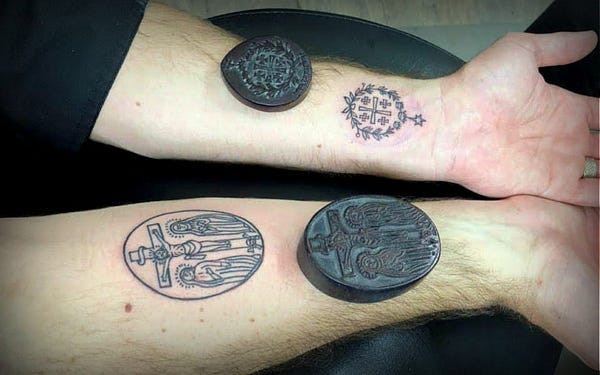
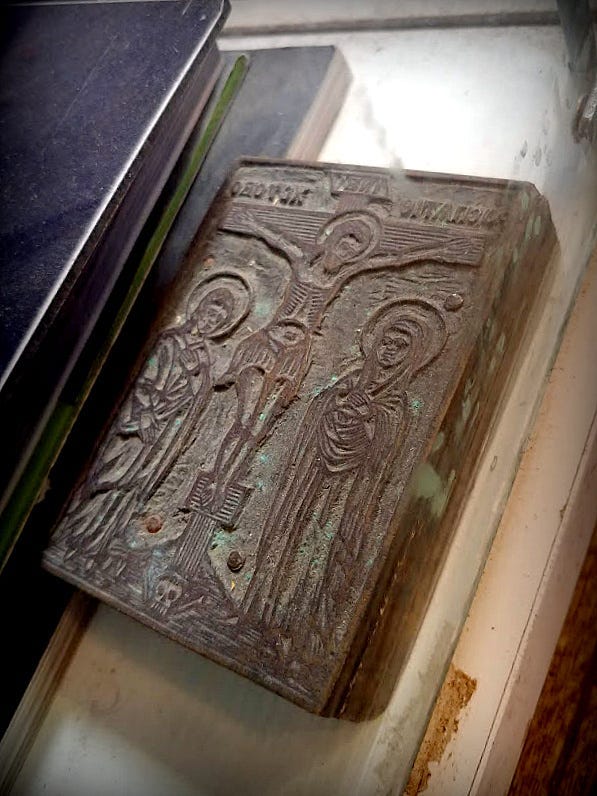
Take a look at this video about pilgrim tattoos from the Canadian Broadcasting Corporation.

